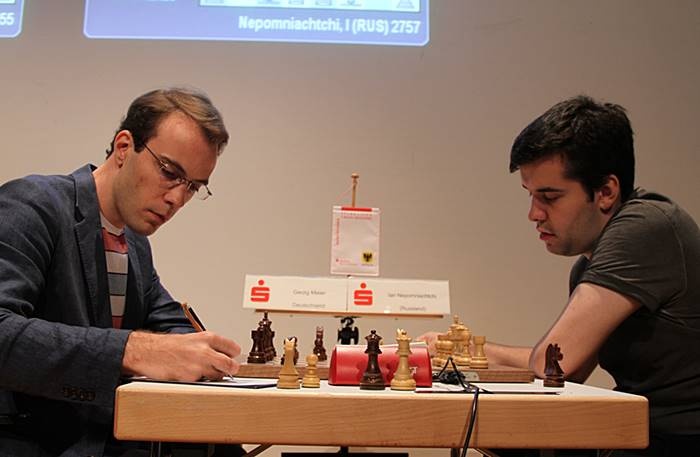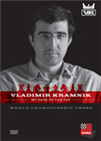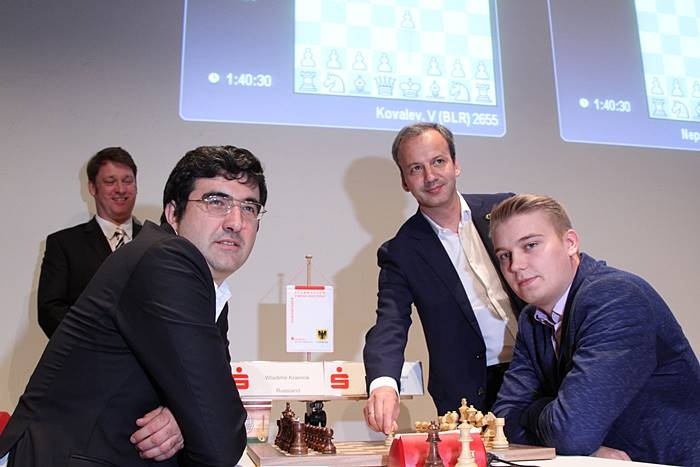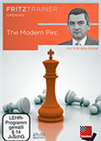A fitting champion
Those who followed the tournament closely most likely agree that Ian Nepomniachtchi deserved to take clear first place. He could have lost a couple of games, but to be resourceful while defending inferior positions is a key skill to compete at the very top. Nepo showed a blend of his usual pragmatic quick-paced style and some great preparation in the opening to get this win.
If we take a look at his performance in Dortmund, he won three out of his four games with White — he only drew Giri, from a position of strength. On the other hand, he had to survive twice with Black, against Kovalev and especially against Duda. In the end, his display allowed him to win the event on 5/7, leaving three players a whole point behind in the short single round robin.
This was Nepo's third good result in a row, as he arrived after finishing second in Poikovsky and winning the Gideon Japhet Cup in Jerusalem. He is now the twelfth highest-rated player in the world — his result in Dortmund allowed him to overstep Aronian, Grischuk and Yu Yangyi in the ratings list. This might definitely be a breakthrough year for the 28-year-old.

Nepo had a tough task in his last round game | Photo: Georgios Souleidis
In his final game in Dortmund, he had to face the ever-solid Georg Meier with the white pieces. After going for 1.e4, it was almost certain that Georg was going to defend with the French, and that is exactly what happened. Nepo showed good preparation and great instincts during the early middlegame. By move 20, it was clear that only a miracle would save Meier. IM Lawrence Trent analysed the game that decided the event:
Ian did not forget to mention that luck was a factor when he expressed his satisfaction on Twitter:
Risk-taking youth
The supertournament debutants Jan-Krzysztof Duda and Vladislav Kovalev showed great nerves all throughout the event and decided to go all-in in their last round encounters. They both ended up drawing, although their games were markedly different.
Kovalev went into a very sharp line against Kramnik. The player from Belarus knew that his famed opponent would not shy away from a real fight, and a real fight is what he got. Kovalev had Kramnik thinking already on move 11:
 On this 60 Minutes renowned and successful coach Adrian Mikhalchishin gives simple practical tips how to neutralize and counter the Scotch.
On this 60 Minutes renowned and successful coach Adrian Mikhalchishin gives simple practical tips how to neutralize and counter the Scotch.
Black is a pawn up, but his king's position is clearly dangerous. Soon enough, many pieces were exchanged and Black kept his material advantage, but the initiative was still in White's hands. Eventually, the pressure provoked Black to make a mistake, which allowed Kovalev to use a nice tactical shot:
After 31...Qxf6 32.Qxe4, Black probably counted on 32...Nc3 to get back the exchange, but White followed with 33.Qf3 and Black cannot both defend his knight and avoid White from checking with 34.Rb6+. It is hard to blame Kramnik for missing this, especially from afar, as he had already survived a very sharp opening and came from losing two games in a row.
In the resulting endgame, White had a rook and two pawns against Black's knight and two pawns. The computers say that White should win, but this was certainly not an easy task with Kramnik on the other side of the board. The former world champion defended quickly and accurately until Kovalev finally agreed to a draw on move 104. It was clearly the longest game of the event.
 On this DVD Vladimir Kramnik retraces his career from talented schoolboy to World Champion in 2006. With humour and charm he describes his first successes, what it meant to be part of the Russian Gold Medal team at the Olympiad, and how he undertook the Herculean task of beating his former mentor and teacher Garry Kasparov.
On this DVD Vladimir Kramnik retraces his career from talented schoolboy to World Champion in 2006. With humour and charm he describes his first successes, what it meant to be part of the Russian Gold Medal team at the Olympiad, and how he undertook the Herculean task of beating his former mentor and teacher Garry Kasparov.
Arkadij Dvorkovich made the first move in Kovalev-Kramnik | Photo: Georgios Souleidis
On another board, Duda had Black against Anish Giri. The Polish star used the Pirc Defence and a sharp battle with opposite-side castling ensued. Giri had the upper hand during the complex middlegame, but the shots that would have given him a win were very difficult to find over the board. It was the kind of game that can be analysed endlessly. Lawrence Trent pinpointed the critical moments in his annotations:
 The Modern Pirc is actually a mixture of the Caro-Kann and the Pirc. In many lines Black combines the ideas of the classical Pirc in which the fianchettoed bishop is important with the Caro-Kann idea to fight for the center with c6-d5.
The Modern Pirc is actually a mixture of the Caro-Kann and the Pirc. In many lines Black combines the ideas of the classical Pirc in which the fianchettoed bishop is important with the Caro-Kann idea to fight for the center with c6-d5.
Giri and Duda shared the second place with Kovalev on 4/7 | Photo: Georgios Souleidis
The only game that was not going to have a say in deciding the tournament winner was also the least exciting. Defending champion Radek Wojtaszek and Liviu-Dieter Nisipeanu played a quiet position that ended in a draw after 34 moves. The experienced grandmasters will undoubtedly recover from their subpar performances in Dortmund.

A group photo to close the traditional event | Photo: Georgios Souleidis
Final standings
Games of Round 7
Links



























